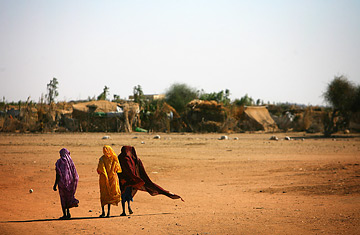
Visit Sam Ouandja's school early in the morning, and you'll find headmaster Idrice Patrice lining up dozens of grubby but excited children and then teaching French class in shifts, 50 kids at a time. Head to the nearby open-pit mines the same afternoon, and you'll find Patrice, again, this time bearing a shovel and sweating as he digs in search of one precious stone.
"I get some money for my teaching from time to time but, to tell the truth, I haven't been paid for 17 months," Patrice explains. "So, when I heard this mine had opened, I decided to come and try my luck."
"If I find something, I will abandon the state," he adds before loading another tray of gravel onto his wife's head so she can take it to the river to rinse and scour it for that elusive diamond.
Sam Ouandja, up in the turbulent and remote northeast of the Central African Republic (CAR), not far from the border with Sudan's Darfur, is connected to the capital, Bangui, by rutted roads that become impassable in the rainy season. The town and its residents have long been abandoned by the state. Still, Patrice has not lost hope that, one day, someone in Bangui might recognise his efforts as an educator.
That seems unlikely in the run-down mining town that didn't even exist until some German miners set up a company called SAM near the town of Ouandja. The mining company's departure and decades of neglect and insecurity have left the remote northern town a forgotten backwater — like the country of which it forms part.
Even a recent rebellion, in which several hundred disgruntled former supporters of current President Francois Bozize took up arms and began marching south, failed to attract much attention. And this despite the fact that the rebels routed the handful of government forces they encountered, only to be stopped by French troops with air support. France, the former colonial power, keeps several hundred soldiers in the CAR, and has long played a kingmaking role in Bangui despite over 40 years of independence.
A hasty peace deal and the nomination of one of the rebels as a presidential advisor have led to an uneasy peace. In Sam Ouandja, the rebels, like headmaster Patrice, are scrabbling to make ends meet. Temporarily downing their Kalashnikovs, they pick up shovels and head to the mines in search of diamonds, before retiring to the marketplace in the afternoon to strut their stuff and show who is really in charge.
It's hardly an investment-friendly environment, with fuel prices lately having more than doubled and the rebels imposing their own informal taxes on anyone doing business in the town.
Only a handful of hard-nosed diamond buyers take the risk of flying into Sam Ouandja these days — most fear that they and their money would simply disappear. So those who do come get their stones on the cheap.
"Even if I find something, I won't say anything. All these men are listening out for the discovery of a stone," says Patrice as he sees a handful of rebels walking towards the riverside mine. "If you find something you have to just remain calm and pretend nothing has happened," he adds.
The idea that misery loves company appears to have been at work last summer when several thousand refugees, fleeing attacks by the Janjaweed militia in Darfur, arrived in Sam Ouandja — a town where locals live in fear of their own gunmen. Ironically, however, rather than worsen the plight of already impoverished and isolated people, the arrival of the Darfur refugees has been a blessing.
"Before the refugees, the population here had lots of problems," the deputy mayor of the town confessed to a group of visiting aid workers and donor representatives. Now, several international aid agencies have set up shop in the town to look after 2,500 Sudanese living in a camp nearby. And, with the aid workers have come some jobs, and a few more trucks carrying food and the odd crate of beer. Civilians who had fled miles into the bush, either escaping conflict or searching for diamonds, have started returning, many hungry and severely malnourished.
Where the residents of Sam Ouandja were fortunate is that the refugees in their midst came from Darfur, Africa's most publicized conflict. Hundreds of thousand others in the CAR have been forced to abandon their homes by a combination of local rebels, government forces and bandits, but receive far less attention. And few in the town have many illusions about how much help they'll get if or when their Darfuri visitors feel it is safe to return home.
"Since independence the governments and the presidents have forgotten about the northeast," says El Hadj Abdullah Yusuf, an elder and one of the biggest traders in the town of 20,000. "If it wasn't for the aid workers there would be no hospital here," he sighs.
